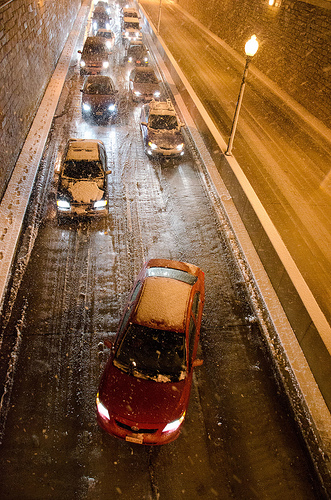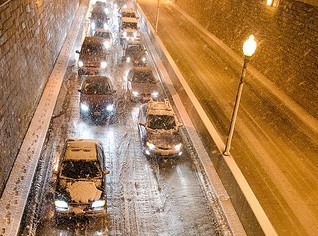 Photo: erin mThe commute home last night for tens of thousands of Washington, D.C.-area commuters was an epic journey, and an epic fail. Snow and ice paralyzed the region’s roads, trapping motorists in a nightmare of congestion.
Photo: erin mThe commute home last night for tens of thousands of Washington, D.C.-area commuters was an epic journey, and an epic fail. Snow and ice paralyzed the region’s roads, trapping motorists in a nightmare of congestion.
TBD told the story this morning:
“It’s a rush hour that will not be forgotten for a long time,” said Joan Morris, a spokeswoman for the Virginia Department of Transportation (VDOT). …
As accidents crippled most of the major roadways, the typical half-hour commute turned into an 8-hour odyssey for some.
The crashes and icy conditions throughout the area put transportation and public-works teams in a jam. Authorities couldn’t get tow trucks to disabled cars, which in turn meant more people were gridlocked. Some people ended up abandoning their cars altogether and trying to walk home. Traffic backed up for miles.
The event made it agonizingly clear just how easy it is for a region where people live far from their work — and where most commute by car — to become paralyzed.
And so it was especially disturbing to see a report that Greater Greater Washington posted today about a bill currently working its way through the Virginia Legislature — a bill that would encourage further sprawl development in the region:
HB1998 would make it state law to base transportation decisions on traditional traffic models, which consider only the fast movement of cars and nothing about how closely people live to their jobs, the relative value of transit versus roads, safe movement of pedestrians and cyclists, or any other factors.
This bill is, in essence, the exact opposite of the USDOT’s “livability” push. That agency has been retooling the formulas for federal transit funding to move away from only favoring projects that move the most people the longest distance …
Last night’s snow … showed how living long distances from work can create serious problems for commuting during major snows. Some people faced up to 5-hour or even 8-hour commutes home. Virginia shouldn’t be creating legal requirements to develop in patterns that will only set the stage for more of these horrific experiences.
Rather than throwing more money to exacerbate existing problems, Virginia should invest in growing cities and towns with jobs and housing close together.
But apparently in the Virginia Legislature, there is bipartisan opposition to smarter regional planning. The bill made it out of the house transportation committee earlier this week without debate.
Maybe the next time the representatives who voted “yes” get stuck in traffic they can think about it some more. We’re sure it won’t be long until they have the opportunity.



